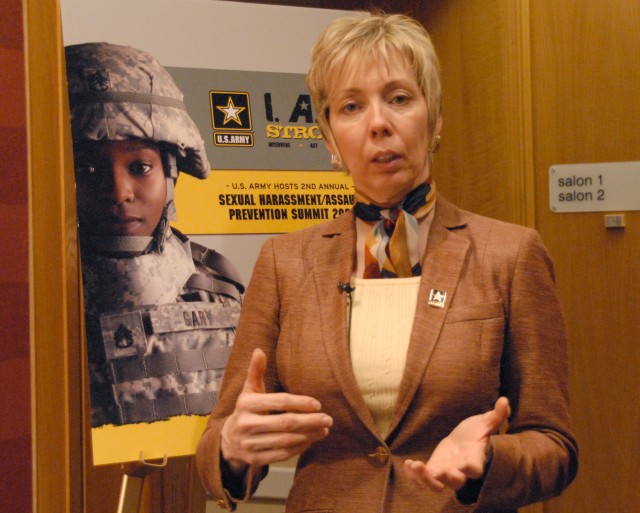WASHINGTON (Army News Service, Apr. 8, 2009) - Every Soldier is responsible for stopping sexual harassment and assault, the director of the Army's Sexual Harassment and Assault Response and Prevention program said in an interview Tuesday at the second SHARP summit in eight months.
Carolyn Collins explained that the Army is counting on noncommissioned officers and Soldiers to help stop the problem before it starts by stepping in if they see disturbing behaviors.
For example, Soldiers can intervene by taking other Soldiers aside if they are harassing or intimidating others, or they can make sure a Soldier gets home safely if she's had too much to drink and can't refuse another Soldier's advances.
"We need every Soldier on board to be successful in this effort and ensure Soldiers' safety," Collins said.
Known as "Army-wide conviction," this is the second phase of the Army's efforts to stem sexual assault and harassment in its ranks and is expected to last about two years. Launched in September, the first phase concentrated on leadership and the third will focus on culture change.
"NCOs are critical in assisting us and making sure every Soldier understands the Army's intent by encouraging them and really setting the standard that this is how they feel about it: they expect them to intervene, they expect them to take care of their fellow Soldiers as they would on a battlefield, they would in a bar, in the barracks. When they see a red flag, they address it," she said.
According to Collins, the Army is also extending sexual harassment and assault prevention training to Reserve Officer Training Corps and West Point cadets in their freshmen year, and to new recruits before they even arrive at basic training. She said that because many attitudes and behaviors are learned early in life, even Junior ROTC cadets in high school will benefit from training.
She added that an important part of prevention is making sure perpetrators of sexual assaults are prosecuted, and that starts with the victim. While assault victims can choose whether to make a restricted or unrestricted report, Collins encouraged unrestricted reporting, in which all evidence is turned over to the Criminal Investigation Command.
In a restricted report, a victim can go to medical authorities and receive help, and even a forensic exam if she wishes, but everything is kept confidential. If, after a year, the victim hasn't changed her mind and decided to make it unrestricted, the evidence is destroyed.
Victims can also report an assault to their unit victim advocate or a sexual assault response coordinator, CID or the military police or their chain of command. All commanders are required to forward assault reports to CID, however. While commanders can decide to separate victim and alleged offender if they are in the same unit or order a military protective "no contact" order, they cannot determine the case.
CID and the Army's Judge Advocate General Corps are also changing how they handle sex crimes, Collins said. CID units are standing up civilian-style special victims units which will focus solely on sexual assault cases.
A specialized training team has already trained more than 230 CID officers as well as JAG officers in how to investigate and prosecute rape cases and the Army is in the process of hiring seven highly qualified experts, 35 specialized investigators and 30 new examiners for the Army Criminal Investigation Laboratory in Atlanta. The lab supports all DNA testing in these types of cases, not just for the Army, but for the Department of Defense.
"We are looking to be the nation's model for special victims units and how we respond to these crimes," she said. "Obviously, how we respond to crimes assists us when we build a community of prevention (because) crimes are not tolerated and individuals are held accountable for their crimes. That also speaks to prevention and encouraging victims to come forward and report the crimes so they can be investigated and offenders can be held responsible."
Related Links:
Sexual Harassment/Assault Response & Prevention (SHARP) Program


Social Sharing